Atlanta rosea
Atlanta rosea
Roger R. SeapyIntroduction
Atlanta rosea attains a moderately large size (to 5 mm). Its shell morphology is very similar with that of A. peronii, with which it was synonymized in 1908 and remained so until 1993, when it was shown to be a valid species. The distinguishing features of its shell that separate it from other members of the A. peronii species group are the low rounded (or globular) spire and the very shallow spire sutures of the first 2-1/2 whorls. The shell is transparent to faintly yellow. The body coloration and keel base are rose colored, according to Souleyet who described the species in 1852. The larva is bright pink, which distinguishes it from the larvae of other species in the A. peronii species group. Eyes type b. Operculum type b. Radula type II. The species is circumglobal in tropical to subtropical waters, and is regarded as rare. Nothing is known of its vertical distribution.
Diagnosis
- Maximal shell diameter = 5 mm
- Shell spire low and rounded
- Spire sutures very shallow for the first 2-1/2 whorls
- Body and keel base light rose colored; larval body bright pink
- Eyes type b
- Operculum type b
- Radula type II
Characteristics
- Shell
- Shell moderately large (to 5 mm diameter)
- Shell transparent to faintly yellow
- Spire rounded, approximately globular in shape
- Spire consists of about 3-1/2 whorls, with suture separating the first 2-1/2 whorls very shallow; the result being a nearly smooth spire surface (see second SEM below)
- Keel inserts between penultimate and last whorls in shells larger than about 1.5 mm (see first SEM below)
 Click on an image to view larger version & data in a new window
Click on an image to view larger version & data in a new window Click on an image to view larger version & data in a new window
Click on an image to view larger version & data in a new window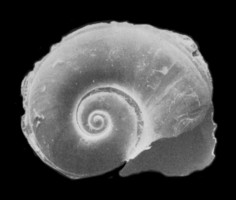
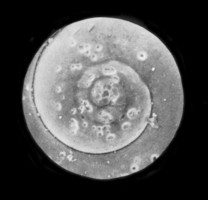
Figure. Scanning electron micrographs of the shell of Atlanta rosea viewed from the right side (left) and the central part of the spire (right). Note that the keel is broken off from the bottom of the shell in the first image, but that the inserted portion (between the penultimate and last whorls) can be clearly distinguished. Shell diameter = 3.0 mm. From Richter (1993, figs. 4 and 8, respectively). © 1993 G. Richter
- Larval shell with somewhat elongated aperture and rounded, globular spire
- Larval shell with a bright pink tinge, which immediately distinguishes it from the larvae of others in the Atlanta peronii species group (Richter and Seapy, 1999)
- Body coloration rose colored, as is the keel base (Souleyet, 1852). The photograph below was taken of a live specimen collected in Hawaiian waters in 1984 that was identified as A. peronii?; unfortunately the specimen was not retained. Because of the light rose coloration of the body and the rose color of the spire region and keel base, the specimen hypothetically could be A. rosea.
 Click on an image to view larger version & data in a new window
Click on an image to view larger version & data in a new window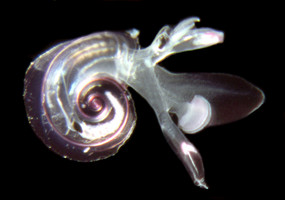
Figure. Photograph of a live specimen from Hawaiian waters, tentatively identified as Atlanta peronii?. © Roger R. Seapy
- Eyes type b
- Operculum type b
- Radula type II
Comments
Souleyet described Atlanta rosea (under the vernacular name Atlante rose) from specimens collected by the Bonite Expedition in the western Pacific Ocean. He regarded A. rosea as most closely related to A. peronii, citing a larger spire size in A. rosea, and naming the species on the basis of the rose color of the body and keel base. Tesch (1906, p. 10) reported A. rosea from samples collected during the Siboga Expedition in the East Indies. However, in his revision of the genus Atlanta in 1908, Tesch rejected A. rosea as a valid species, designating it as a junior synonym of A. peronii. Subsequent authors (notably Tesch, 1949 and van der Spoel, 1976) accepted Tesch's merger of A. rosea with A. peronii. But in a 1993 paper on the species comprising the A. peronii species group, Richter (1993) provided conclusive evidence that Souleyet was correct in treating A. rosea as a species distinct from A. peronii. The primary shell difference was in the rounded spire shape and the shallow sutures in the early spire whorls of A. rosea. These differences in the spires of A. rosea and A. peronii are clearly seen by dark field photographs (from Richter, 1993) of the larval shells of the two species in apertural view (see below)

Figure. Larval shells of Atlanta rosea (left) and A. peronii (right); apertural views of the shells using dark-field, transmitted light. From Richter (1993, figs. 4 and 1, respectively). © 1993 G. Richter
In a paper on the heteropods of the South Atlantic Ocean, Richter (in Richter and Seapy, 1999: 638) stated that "in 1908 Tesch united A. rosea with A. peroni probably because the holotypes in the Musee d'Histoire Naturelle de Paris were already badly damaged (shells dissolved) when he had the opportunity to study them". Comparing "aberrant" shells of A. peronii from the Indian Ocean and the tropical Atlantic Ocean with the type shells of Souleyet, preserved dry in the British Museum, London, Richter (1993) found that they belonged to this very species.
References
Richter, G. 1993. Zur Kenntnis der Gattung Atlanta (V). Die Atlanta peroni-Gruppe und Atlanta gaudichaudi (Prosobranchia: Heteropoda). Archiv für Molluskenkunde 122: 189-205.
Richter, G. and R. R. Seapy. 1999. Heteropoda, pp. 621-647. In: D. Boltovskoy (ed.), South Atlantic Zooplankton. Backhuys Publishers, Leiden.
Souleyet, L. F. A. 1852. Heteropodes, pp. 289-392. In: J. F. T. Eydoux and L. F. A. Souleyet, Voyage autour du monde exécuté pendant les années 1836 et 1837 sur la corvette 'La Bonite', commandée par M. Vaillant, capitaine de vaisseau, publié par ordre du Gouvernement sous les auspices du Département de la marine. Zoologie, 2. Atlas. A. Bertrand (ed), Société de Géographie, Paris.
Spoel, S. van der. 1976. Pseudothecosomata, Gymnosomata and Heteropoda (Gastropoda). Bohn, Scheltema and Holkema, Utrecht. 484 pp.
Tesch, J. J. 1906. Die Heteropoden der Siboga-Expeditie. Monographie 51, 112 pp., 14 plates. E. J. Brill, Leiden.
Tesch, J. J. 1908. Systematic monograph of the Atlantidae (Heteropoda) with enumeration of the species in the Leyden Museum. Notes from the Leyden Museum 30: 1-30, 5 plates.
Tesch, J. J. 1949. Heteropoda. Dana Report 34, 53 pp., 5 plates.
About This Page
Roger R. Seapy

California State University, Fullerton, California, USA
Correspondence regarding this page should be directed to Roger R. Seapy at
rseapy@fullerton.edu
Page copyright © 2011 Roger R. Seapy
 Page: Tree of Life
Atlanta rosea . Atlanta rosea .
Authored by
Roger R. Seapy.
The TEXT of this page is licensed under the
Creative Commons Attribution License - Version 3.0. Note that images and other media
featured on this page are each governed by their own license, and they may or may not be available
for reuse. Click on an image or a media link to access the media data window, which provides the
relevant licensing information. For the general terms and conditions of ToL material reuse and
redistribution, please see the Tree of Life Copyright
Policies.
Page: Tree of Life
Atlanta rosea . Atlanta rosea .
Authored by
Roger R. Seapy.
The TEXT of this page is licensed under the
Creative Commons Attribution License - Version 3.0. Note that images and other media
featured on this page are each governed by their own license, and they may or may not be available
for reuse. Click on an image or a media link to access the media data window, which provides the
relevant licensing information. For the general terms and conditions of ToL material reuse and
redistribution, please see the Tree of Life Copyright
Policies.
- First online 05 February 2010
- Content changed 23 July 2011
Citing this page:
Seapy, Roger R. 2011. Atlanta rosea . Atlanta rosea . Version 23 July 2011 (under construction). http://tolweb.org/Atlanta_rosea/28771/2011.07.23 in The Tree of Life Web Project, http://tolweb.org/




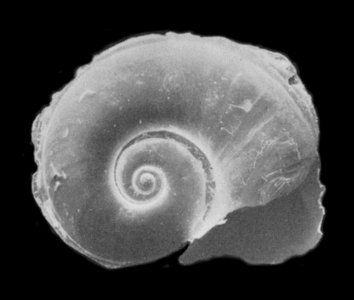
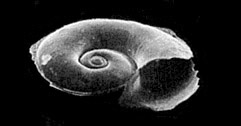
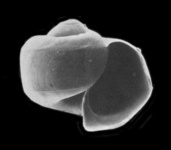
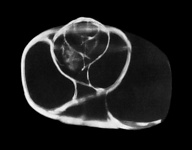
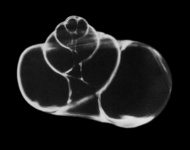
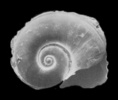


 Go to quick links
Go to quick search
Go to navigation for this section of the ToL site
Go to detailed links for the ToL site
Go to quick links
Go to quick search
Go to navigation for this section of the ToL site
Go to detailed links for the ToL site